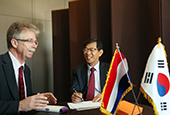With their weight being equal, seeds are often twice or three times more expensive than gold. The seed industry is a high added-value sector. Thus, it is very important to develop technologies to verify the composition of a variety of seeds, their authenticity and their germination rates.
Agronomists from various Asian nations have now gathered at the Korea Seed and Variety Service (KSVS) in Gimcheon, Gyeongsangbuk-do (North Gyeongsang Province). The workshop for seed industry specialists is being hosted by Korea and is attended by 12 other Asian nations and will run for two weeks from November 23 to December 6.
At the workshop, participants are sharing their seed quality verification technologies. They aim to develop related industries in Asia and the Pacific and to boost the distribution of first-grade seeds. The workshop consists of lectures and includes practical training on how to sample seeds, calibrate germination rates, purity and moisture, depending on the variety in question. There is also an education session on DNA analysis to distinguish species and to examine seed-related diseases.
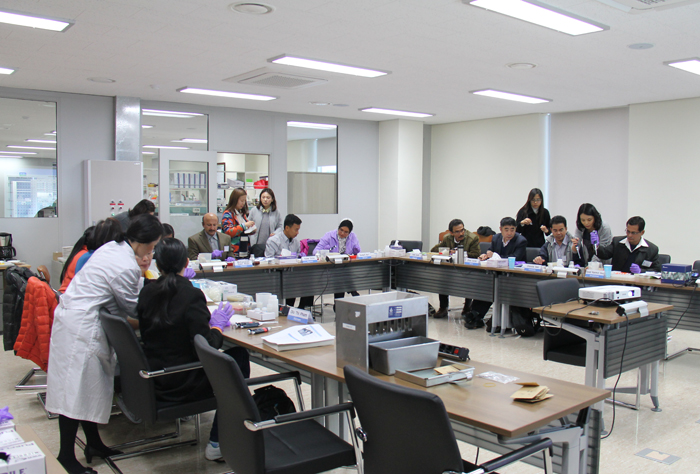
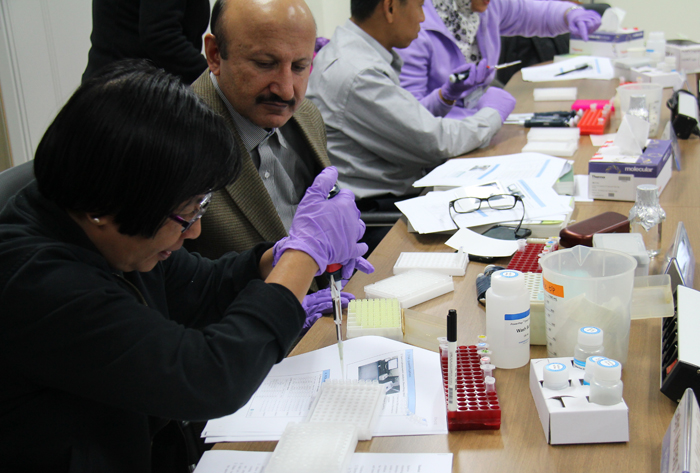
Participants in the seed industry specialist workshop learn how to conduct DNA analysis at the Korea Seed and Variety Service in Gimcheon, Gyeongsangbuk-do.
The Korea Seed and Variety Service is hosting the workshop in order to train seed testing specialists across Asia and to raise awareness of the seed industry in the region. It has also provided the equipment and related software to various Asian nations to increase their capacity to test seeds. The workshop has been held every year since 2008 and a total of 80 professionals from 14 nations have since taken part in the workshop. All the programs in the workshop are in line with rules established by the International Seed Testing Association (ISTA).
The KSVS has produced and supplied seeds to local farmers, including rice, barely and beans, and is responsible for issuing certificates to guarantee the quality and variety of seeds produced by seed companies for their domestic and international transactions. The Seed Testing and Research Center, which was set up inside the KSVS when it moved to Gimcheon in July, is responsible for testing the variety of seeds, developing new seeds and hosting the workshop.
Craig McGill, a New Zealander and former chair of the ISTA Moisture Committee, gave a lecture on how to determine moisture in seeds at the workshop on December 4. McGill explained how to eliminate as much moisture from the seed as possible and how to prevent oxidation, decomposition and potential loss of substance at the same time.
He also explained the preconditions and ISTA rules for sampling and analyzing seeds and talked about optimal temperatures, seed drying methods and moisture determination analysis.
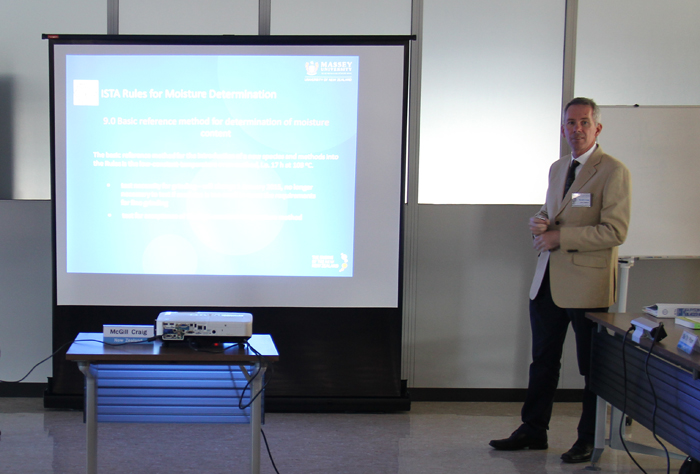
Craig McGill, former chair of the ISTA Moisture Committee, talks about ISTA rules for moisture determination.
After the lecture, participants learned how to handle seed samples and calibrate the moisture in seeds in a laboratory. They also learned how to take samples and minimize contact between the seed and moisture in the air.
"I used to just multiply and provide seeds for farmers in my home country, but I learned how to identify varieties, calibrate their purity and conduct DNA analysis using molecular markers at the workshop today," said Kyaw Thiha, a farm manager at the Pwint Phyu Seed Farm, part of Myanmar's Department of Agriculture. "I also studied Korea's agricultural policy and I will be able to use what I learned here in my country."
Korea.net asked some of the people involved about the importance of their work.
Shin Hyun-kwan, director general of the KSVS, talked about the purpose of the workshop and the establishment of the Seed Testing and Research Center.
- What is the purpose of the seed industry specialist workshop?
The purpose of the workshop is to solve and manage seed related issues. Various Asian nations have requested the sharing of seed testing technology. The project is designed to train Asian specialists in seed industry related technology and management. Some 80 public servants in the field have taken part in the workshop since 2008.
We explain how seed testing systems and related human resources are being managed in Korea and how the local seed industry has developed. There were also lectures on seed quality testing, seed storage management and related standards. In addition to explanations on the situation in Korea, the lectures were in line with international standards.
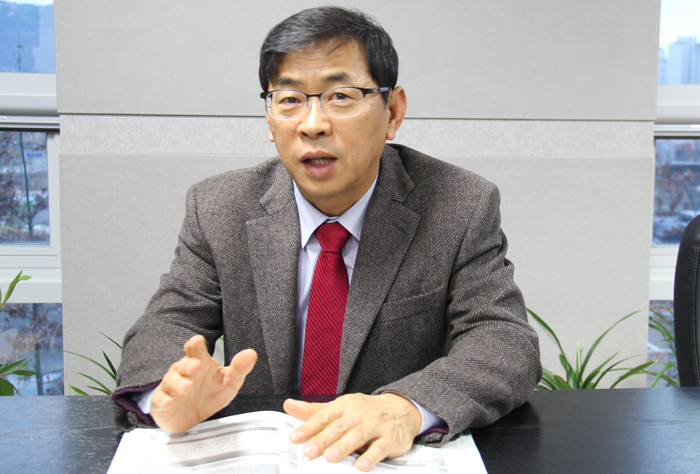
Shin Hyun-kwan, director general of the Korea Seed and Variety Service, says the seed industry is very important for the future.
- What is the purpose of establishing the Seed Testing and Research Center, part of the Korea Seed and Variety Service?
The Seed Testing and Research Center produces seeds and provides them to farmers. The seeds need to meet certain standards and the center checks the quality of the seeds in advance before they are distributed. Even after supplying the seeds, the center tests germination rates to make sure their quality is maintained. When there are seed related disputes, it tests the seeds to resolve problems.
The center manages all seeds distributed in Korea, stores and registers all new breeds, and protects their rights. It also issues ISTA certificates to prove a seed's quality for international trade and educates testing related professionals. It conducts health tests to verify the quality of seeds and checks whether the seeds have diseases or are infested with insects or other pests.
- What are the mid- to long-term goals of the Seed Testing and Research Center?
Now, the center mostly deals with seed testing and analysis. In the future, we will strengthen its research capacity. We will increase its research into seed comparison and analysis and expand education for private sector professionals and overseas specialists. We intend to eventually increase the number of researchers, too.
The seed industry is one of the agricultural sectors that are in line with the current administration's "creative economy" policy. To further develop the local seed industry, we need to cooperate on technology with nations that have a large demand for seeds. Large seed companies have the capacity to test and manage the quality of their seeds but small- and medium-sized enterprises (SMEs) do not. We conduct seed analyses and tests, to see whether they have diseases, on behalf of the SMEs.
Soh Eun-hee is the head of the Seed Testing and Research Center, part of the Korea Seed Variety and Service.
- What are the main roles of the Seed Testing and Research Center?
The Seed Testing and Research Center runs the ISTA laboratory and issues ISTA International Seed Analysis Certificates. The ISTA lab means that the lab is internationally recognized and that it is capable of testing seeds according to global standards. The Seed Testing and Research Center is the only place in Korea that can issue ISTA International Seed Analysis Certificates to prove the quality of a seed for local exporters.
The center is also responsible for storing and managing all seeds circulating in Korea. Now, there are over 30,000 seeds for 618 crops distributed in the country. The center tests their germination rates and authenticity and monitors whether the quality of seed is maintained after the seeds are distributed and planted.
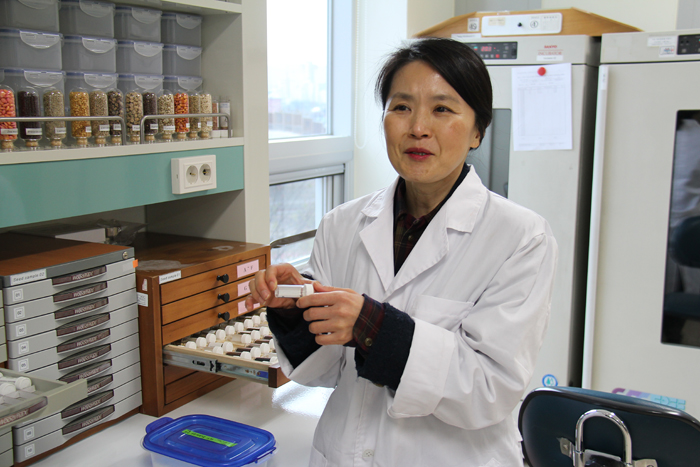
Soh Eun-hee, head of the Seed Testing and Research Center, holds up seeds awaiting DNA analysis.
When seed developers apply for rights protection, the center plants the seeds to test them and conducts DNA analysis to compare them with existing seeds, and to determine whether the new seeds are actually different from existing seeds. The center also verifies whether the newly registered seeds are identical to ones already in circulation and tests whether crops and seeds are infected with viruses, bacteria, molds or diseases.
- What are the main research areas at the Seed Testing and Research Center and what are their applications?
When there are applications for seed patent protection, the center checks whether the patents of developers of existing seeds have been violated. It also compares the newly registered seeds, whose patents are on file, with existing seeds. It also examines whether these seeds are resistant to diseases.
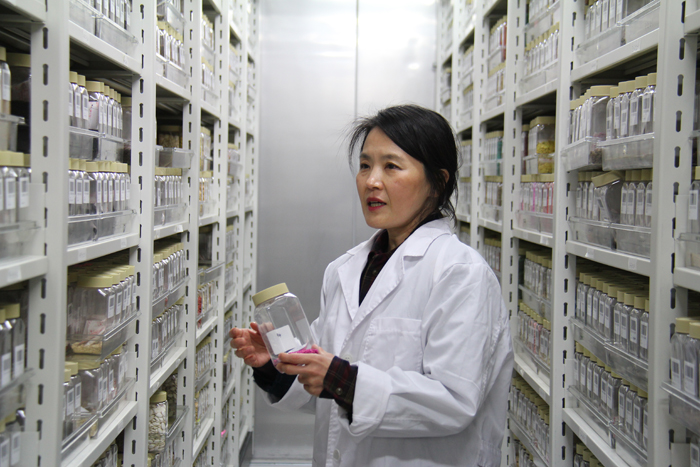
Soh Eun-hee, head of the Seed Testing and Research Center, explains the center's seed management system in a refrigerated sample room in which a sample of all 30,000 seeds currently circulating in Korea are stored.
Where there are disputes or patent violations, we conduct DNA analysis on respective seeds to check the authenticity of the seeds in question. To promote the fair circulation of seeds, we check their germination rates and authenticity.
To develop and produce high-quality seeds, we manage the quality of original seeds and the seeds in circulation. We also develop seed testing technology and have set up a database to record the characteristics of different breeds and their DNA profiles. We test the germination rates of major seeds and their vitality.
- In what kinds of educational activities is the Seed Testing and Research Center engaged?
The center conducts training sessions on seed testing for seed companies, developers and students, among others. We also carry out training sessions for Asian seed professionals in cooperation with the Korea International Cooperation Agency (KOICA). The sessions include education about testing new breeds, DNA testing and disease analysis. From 2015 to 2017, we will establish a seed testing system in Myanmar.
By Limb Jae-un
Korea.net Staff Writer
Photos: Limb Jae-un
jun2@korea.kr
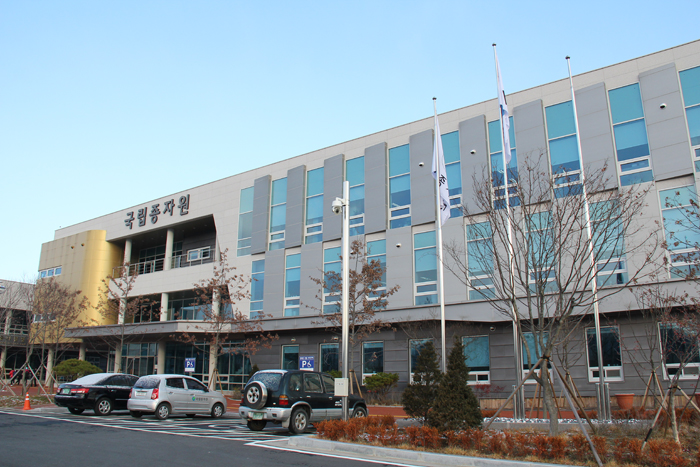
The Korea Seed and Variety Service is in Gimcheon, Gyeongsangbuk-do.
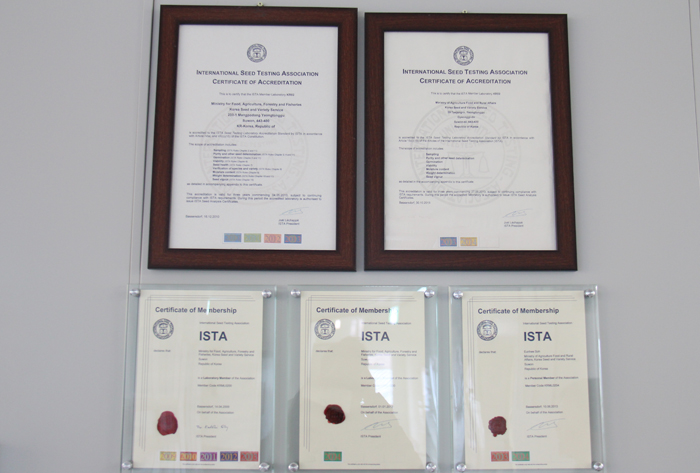
The ISTA certificates of accreditation are mounted on the wall at the Seed Testing and Research Center.
